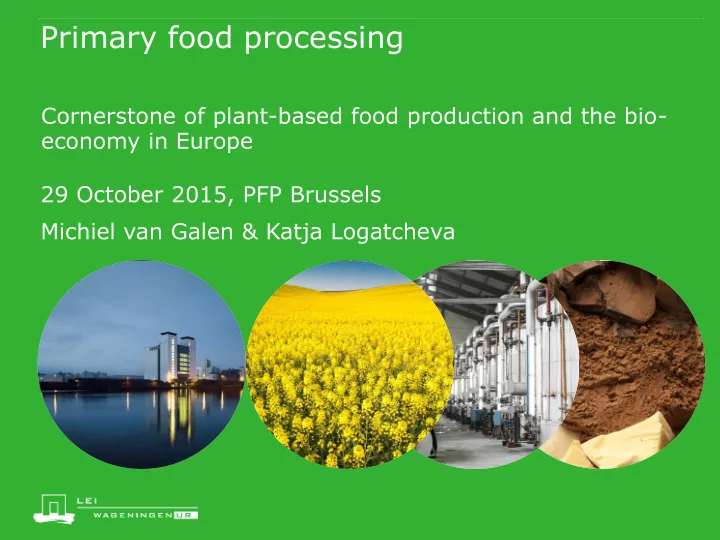

Primary food processing Cornerstone of plant-based food production and the bio- economy in Europe 29 October 2015, PFP Brussels Michiel van Galen & Katja Logatcheva
Contents Introduction of LEI Wageningen UR Research questions Results ● Production value ● Employment ● Investments and R&D ● Opportunities and Threats 2
Introduction of LEI Wageningen UR 1940 Oprichting 1969 Landbouw Economisch Bericht 2001 LEI Wageningen UR 2015 75 jaar LEI 1940 Foundation 1969 Landbouw Economisch Bericht 2001 LEI Wageningen UR 2015 75 years of LEI
LEI Wageningen UR Facts 266 researchers 65% male 35% female Turnover’14 € 31 mln 40% Accepted EU R&D proposals in Yearly around societal challenge 2 100 references in parliament Result ’14 € 230 k Yearly around 500 projects and around 600 official publications
Food Security working on global challenges worldwide Bio-based and circular Economy Natural resources and living environment Sustainable Metropolitan food clusters
Research questions Research commissioned by PFP: ● What is the contribution of the primary food processing industries to the whole of the food and drink industry, and to the whole of the European economy? ● What specific role do the primary food processing industries play in the food value chain? ● What factors will impact the future of the primary food processing industry in the EU? 6
Production value increased despite crisis Total production value in Production value of primary food processing, 2005- 2014, Source: Eurostat the EU is estimated at 30 25 € 66bn in 2013 Vegetable oils and proteins 20 Wheat flour Production value Bn EUR 15 Starches increased despite crisis, 10 Sugar with exception of sugar 5 Cocoa 0 8% of production value of EU food processing Division of production value of food industry manufacturing and primary food processing, in 2013, in %, Source: Eurostat PRODCOM and Eurostat SBS. Price volatility Starches Flour milling Sugar 1.1% 1.6% 1.6% Other food PFP Cocoa processing 8% 0.5% 92% Vegetable oils and proteins 7 2.9%
Employment for over one million people Number of persons employed, x 1,000 Over 120,000 people directly Manufacture of employed in around 4,000 vegetable oils and vegetable proteins companies 18% 28% Manufacture of wheat flour mill products Indirect employment at EU farm Manufacture of level is estimated at almost 1 starches and starch 14% products 40% million Manufacture of sugar Figures based on industry data on crop sourcing from EU, Eurostat Persons employed at EU farm level weighted average EU labour input 400,000 350,000 per hectare of farming type, and 300,000 250,000 200,000 FAOSTAT yields 150,000 100,000 50,000 Excluding other indirect Persons employed at 0 EU farm level employment and excluding cocoa 8
Investment and R&D 17% of investment value of food processing industry Higher average investment rate than food processing Patents are widely used R&D targeting production efficiency, safety and sustainability, and more recently bio-chemicals, bio- refinery and other bio-based processes. Starches, sugars and oils have a huge potential to contribute to a bio- based economy Some of PFP companies are top-R&D performers in EU 9
Opportunities • Bio-based • Close to market, • Process • Consolidation for New markets Competitive edge Sustainability Supply chain demand close to source innovation to cost reduction and close to improve • World food • Integration for trade hubs environmental demand increased performance, • Responsiveness transparency and • Product lower costs, and of the supply limitation of risks innovation be a preferred chain supplier 10
Threats • Increased • Price volatility • Raw material • EU Food Law • Fragmentation Market threats Price risk threats Production threats Regulatory threats Supply chain threats global increases availability because of • Health and competition sustainable • Risk • CAP reform Nutrition certification • Threat of un- management leads to price regulation schemes level playing regulation risk • GMO regulation field (MiFID 2) • Lack of supply • Climate change • Trade chain • Crop protection negotiations transparency • Spread of GMO cultivation 11
Additional conclusions Plant-based primary food processors: ● are important link in many EU food and bio-based supply chains. ● have a central position in food, feed, non-food industrial and energy. ● are major players on the European and world agricultural markets, and have a stake in global agricultural raw material security. ● 200m tonnes sourced from EU farmers. This makes a competitive primary food processing industry also an important pillar for rural development and farm income in the EU. PFP industries have invested in product innovation, making these companies real innovators and R&D performers. 12
Thank you
Recommend
More recommend